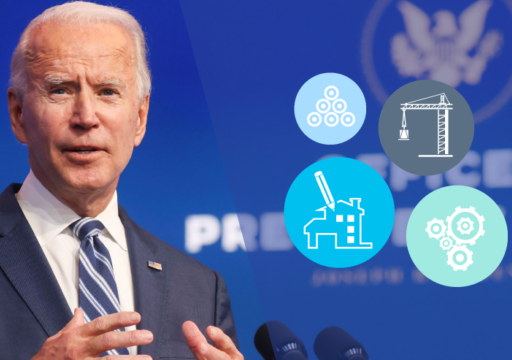
While the COVID-19 pandemic has impacted construction around the US in a number of ways, one effect continuing to have repercussions is continued closure of the US-Mexico border — which has remained closed since March, 2020.
Laredo Outlet Shoppes, LLC filed for Chapter 11 bankruptcy on May 26, 2021, as its parent company, CBL & Associates Properties, Inc., continues to struggle through the bankruptcy proceedings of a number of its affiliates. This filing, as well as other comments from border businesses, is indicative of the heavy impact of the COVID-19 pandemic on the economy of border cities like Laredo.
The bankruptcy of the Chattanooga, Tennessee-based holding company — which operates the Outlet Shoppes of Laredo, located in Laredo, Texas, on the border between the United States and Mexico — comes amidst debts of at least $23,089.45 owed to contractors and suppliers in Laredo.
In total, Laredo Outlet Shoppes has debtors numbering between 200–999, liabilities between $10 million and $50 million, and assets within the same monetary range. The company’s filing lists 19 creditors who hold at least $735,353.17 in unsecured claims, a number of which are held by tenants at the outlet mall.
The company has struggled to maintain its business operations during the pandemic. Despite claiming that at least 1,300 people had been employed by the mall prior to the pandemic, in April 2021, the Outlet Shoppes at Laredo had to negotiate a new financial agreement with the City of Laredo after it could not provide adequate employment statistics to the city’s Webb County.
Contractors have felt trickle-down of pandemic financial woes
Similarly to Laredo Outlet Shoppes’ construction debtors, a large number of contractors have felt trickle-down effects of the pandemic and its effects on businesses over the past year.
According to the Levelset 2021 Payment Survey, nearly 25% of responding contractors have had rising difficulties with collecting on-time payments, with some citing that slow payment or nonpayment has been a result of the pandemic’s financial impacts on their customers.
The pandemic’s impact on the habits of American consumers has led to recent high-profile debts in the construction industry nationwide, as well. As of March 2021, contractors had filed more than $41 million in liens on New Jersey’s American Dream Mall after the pandemic significantly limited its operations, and a spate of bankruptcies in the hospitality industry during 2020 and 2021 have left contractors with millions in claims.
Of course, the bankruptcy filing is not a death knell for its operations or for the mall’s tenants, as Chapter 11 bankruptcy allows for a debtor to continue its business operations and even borrow money if necessary.
A Chapter 11 filing requires the debtor to develop a plan to reorganize and structure its business so it can repay its creditors over time — however, this process may be complicated for Laredo Outlet Shoppes as CBL & Associates attempts to navigate the proceedings of a large number of its affiliate companies.
Closure of US-Mexico border may continue to put pressure on border economies
As CBL & Associates attempts to maintain its operations and profitability, many of its businesses like Laredo Outlet Shoppes may continue to struggle as long as the border between the United States and Mexico remains closed. According to the company’s website, it currently operates six properties along the border.
The US border was originally intended to reopen for non-essential travel on May 21, 2021, but this was extended to June 21, 2021, after US officials noted in May 2021 that discussions with Canada and Mexico had not not led to any agreement on lifting travel restrictions amid the ongoing pandemic.
Irasema Coronado, director of the School of Transborder Studies at Arizona State University, noted this in January 2021: “Border economies are interdependent. There are many businesses on the US side of the border that rely and thrive on Mexican shoppers…Likewise, there are businesses in Mexico that rely on US shoppers to come and buy.”
Deputy Director of the Wilson Center’s Mexico Institute Christopher Wilson said that border communities “are getting a double dose of what communities across Mexico and the United States are facing,” specifying that “It’s partially the closure of the border, but also a result of the COVID recession everyone is facing.”
Business owners on both sides of the border have been vocal about their struggles. Aylin Rodríguez, who operates a store in Reynosa, Mexico, communicated her hope that American consumers can return soon, saying “…I have less [sic] clients. Americans used to come shopping here a lot and they were always a very good daily sale.”
Similarly, Isabel Navarro, owner of Nogales, Arizona’s Mis Divinas, said in January 2021 that the pandemic had caused her business to lose “at least” 90% of its customers.
Consumers are eager to return to retail, but the border closure may have continuing effects for the overall economy in Northern Mexico and the Southwestern US even once it has reopened.
Though Mexican shopper Ana Karen Gonzalez Romo joked that “We are all attentive to when the [border] will open. We want the [border] open just so we can go shopping,” she also made the point that economic transfer between the US and Mexico may shift significantly from the pandemic’s effects, noting that “people before, they used to go shopping [in Texas], and now people buy and consume locally.”
Throughout the pandemic, the US-Mexico border has been a significant issue outside of legal travel, as the previous Trump administration committed significant funding to build a wall between the two countries to curb ever-controversial illegal immigration.
On the other hand, the nascent Biden administration and its Congressional supporters have been committed to halting construction as the pandemic continues to rage and border issues have remained pronounced.
President Biden and Vice President Harris have instead focused on changing US policy and negotiating with Central American countries to deal with immigration issues — largely removing the construction industry from the equation.
As such, it is unlikely that any more significant construction will be done on the much-maligned project any time in the near future — US Representative Filemon Vela (D-Texas) recently commented that the previous administration was “funneling billions of dollars into an ineffective and damaging border wall,” and added that “It is clear that the border wall does more harm than good.”

11 Ways President Biden Plans To Impact Construction